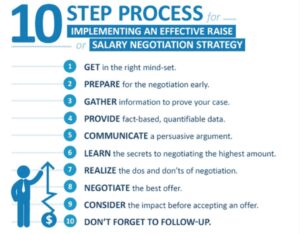We could all use more money in today’s high inflation environment. But getting that pay raise doesn’t always come out of the blue. Managers and supervisors aren’t jumping at the chance to give you a raise for all your hard work. It’s not that they are stingy or mean, (although they might be). It’s typically because they have a limited budget to work with and only so many places they can spend it. In order to get a raise, it boils down to you negotiating for the the money you deserve. It’s up to you to communicate their need to give you a raise. Sometimes all it takes is to be visible and explain your worth to others. Those who have the power to approve the raise might not even be aware of your value. You have to take control of the situation and persuade others to open the purse strings for you.
Negotiating 101
Negotiating is an art and a skill, and it requires significant preparation. It is the tool you use to convince others that it is time to bump you up in pay. Although negotiating sounds unpleasant, it could be the best paid hour of your life. In a nutshell, negotiation is a discussion between two or more parties who must cooperate to achieve their respective goals. Negotiations require a give and take by both parties to attain a result that is mutually beneficial.
In negotiating for a pay raise, you are striking an agreement with another person. While you want this agreement to benefit both parties, you also want to get the most out of it.
Negotiation is often about timing. When the company is profitable or your skills are in demand is the perfect time to negotiate for a raise. Currently, wages are growing fastest in the leisure in hospitality industry so why not take advantage of this growth? Use this timing to your benefit and arm yourself with statistics to back you up.

10 Steps to a Pay Raise
Negotiating can be frightening for some. The word itself has connotations of serious investigations, interrogations, and fighting for your life. But it’s not that at all. Think of negotiation as a form of communication that helps you determine what is best for the parties involved.
There are many angles you can take to approach a negotiation session. Thousands of books have been written, and more are to come, on the art of negotiation. Almost all of these books contain about the same strategies. What follows is a summation of these many various approaches condensed into ten steps. These include:
1. Get your mind right
Asking for a raise can be a stressful time. What led up to this point is often a crisis of sorts. Maybe gas and food prices spiked super high. Perhaps a person in the household providing a second income loss their job. It could be that a person is simply fed up working so hard at the same pay for so long. Going into a negotiation with a heavy burden on your shoulder will hinder your success. Try to go into the process with a smile and a positive attitude. Strive to make the other party feel comfortable and you will have a greater chance of getting what you want.

2. Be prepared going in
Preparation is key when it comes to negotiating anything. For negotiating a pay raise, do your homework and write down what you do for the organization. Not just your job description, but share incidents when you went out of your way to help a guest.
3. Gather information
It’s important to have all your ducks in a row before you begin negotiating. Find out what other markets are paying for the same position you’re in. Look up comparable segments of the industry, (hotels, restaurants, etc.), and gather timely information to share.
4. Provide data
Share stats and realistic information about where the industry was and where it is going. Show your boss you are in tune with the market and that you know how valuable your position is.
5. Hone your communication skills
Know before going in that listening is the better part of communication. Be gracious and appreciative for the position and ask them how you can do more for the organization. Listen to their responses and take notes. The idea is to give them the real impression that you are a winner. You’re looking for more responsibility and more pay. But you also want to show them how you can add even more value to the company.
6. Shoot for your high mark
Ask for the high number you have in mind, but always remain flexible. Keep the big picture in mind. Since there are many variables for your supervisor to consider, help them to come to the right conclusion. Don’t get fixated on just the raise, but be flexible and keep thinking about how you add value.
7. Understand there is give and take
At its core, negotiation is an effort to solve a problem and reach an agreement. Understand that you are working with the other side and not against them.
8. Negotiate your best offer
Don’t shilly-shally with your number. Do your homework and know what it is you are seeking and what you will settle for in the negotiation. You can’t leave the other party hanging with a request like, “I need more money.”
9. Consider the final agreement
After skillful and careful negotiating, your employer may give you a raise. That’s great! But think about what was said. Is the raise contingent on anything like coming in early on weekends? Did the settled amount have a sunset date or ending in six months? Or, does it stand in place for the next three years?
10. Follow up on the negotiating meeting
Within the next day or so, send an email to your superior thanking him or her for the meeting. Recap what was stated and ask if your summation of the meeting is correct. Confirm what the raise is and any other agreements that were made. Ask if you can meet with them again in a month to follow up on performance or any other issues.
According to a survey conducted of 874 US organizations by Salary.com, 37% are expecting to increase salaries. Businesses may be leaning toward giving more to its employees, but they may need a nudge to do so. This is where using the above ten strategies can help you to win what you deserve.

Negotiating is Not a Fight
Go into the meeting understanding that negotiation is a skill built around dialogue. It is putting your best communication skills to work. If you hesitate to negotiate because it feels adversarial, readjust your view of negotiating. It’s not a battle. It’s problem-solving at its best. You are trying to resolve the issue of a pay increase. Going into the conversation with a hostile attitude is a bad negotiation move. Don’t be overly aggressive or angry but be gracious and reasonable.
Negotiation is about meeting your interests in the most mutually beneficial way you possibly can. You are solving a problem for yourself and for your employer. The time period of negotiation will be remembered by others. Keep in mind you are impressing them with your ability to negotiate reasonably and effectively. This too will help you in the long run when it comes to seeking future raises or benefits.

